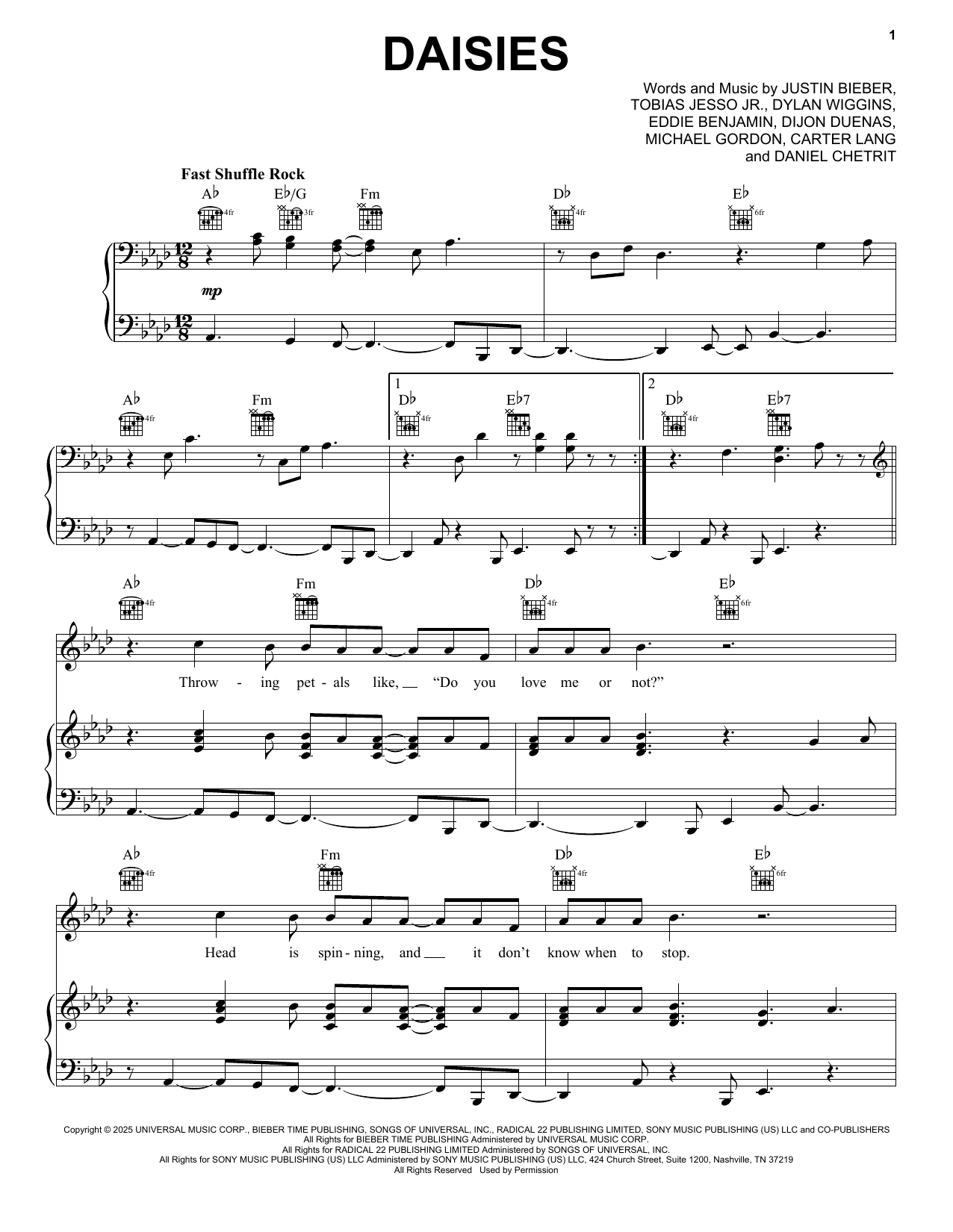The song is in A♭ major and uses a repeating chord progression: Ab–Fm–Db–Eb. This loop, played at around 110 BPM in 4/4 time, forms the harmonic backbone of the piece.
Overwhelmed by the complexity of learning Justin Bieber’s “Daisies” on piano? You’re about to discover how to master this beautiful pop ballad in record time. Your journey to playing this emotional hit becomes effortless with our comprehensive sheet music PDF, featuring simplified chord progressions and clear fingering guides. Whether you’re a beginner or intermediate pianist, you’ll find our professionally arranged version perfectly balanced to help you achieve that authentic Bieber sound while maintaining the song’s emotional depth.
Unlocking the Melodies: Exploring Sheet Music Options for “Daisies”
Different Formats: PDF, Notation, and Interactive Sheets
The sheet music for “Daisies” comes in multiple formats to suit your learning style. PDF versions offer instant downloads for printing and digital use, while traditional notation provides the classic staff paper experience. Interactive sheets through modern apps let you adjust tempo, transpose keys, and isolate specific parts. Each format includes chord symbols, fingering suggestions, and dynamic markings to help you master the piece.
| Format Type | Key Features |
|---|---|
| PDF Download | Instant access, printable, device-compatible |
| Traditional Notation | Standard staff paper, detailed markings |
| Interactive Digital | Tempo control, transposition, part isolation |
Grading the Difficulty: Beginner, Intermediate, and Advanced Arrangements
You’ll find “Daisies” arranged across three difficulty levels, each tailored to different skill sets. Beginner versions simplify the rhythm and chord progressions, while advanced arrangements incorporate complex harmonies and ornamentations. The intermediate level strikes a balance, maintaining the song’s core melody while introducing more challenging elements.
- Beginner: Simplified chords, basic rhythm patterns
- Intermediate: Original melody with moderate complexity
- Advanced: Full harmonization, embellishments, complex rhythms
Difficulty Level Breakdown
| Skill Level | Key Components |
|---|---|
| Beginner | Single-note melody, basic chords |
| Intermediate | Full chord progressions, moderate tempo |
| Advanced | Complex arrangements, artistic interpretation |
{VIDEO} Justin Bieber – Daisies Piano Tutorial – Learn to play in minutes
Mastery Through Repetition: Essential Tips for Practicing “Daisies”
Break down “Daisies” into smaller, manageable sections of 4-8 measures each. Focus on mastering one section at a time before moving to the next. Practice the left-hand chord progressions separately from the melody to build muscle memory. Set your metronome to a slower tempo initially, gradually increasing speed as your confidence grows. After consistent practice using these methods, you’ll notice significant improvement in your overall performance.
- Practice each hand separately first
- Use a metronome to maintain rhythm
- Record yourself playing to identify areas for improvement
- Take regular breaks to prevent fatigue
The Role of Consistency in Developing Your Skills
Dedicate 15-30 minutes daily to practicing “Daisies” rather than longer, irregular sessions. Your brain forms stronger neural connections through frequent, focused practice periods. Track your progress using a practice journal to maintain motivation and identify challenging sections. After two weeks of consistent practice, you’ll notice remarkable improvements in your playing fluidity.
Utilizing Tools and Apps for Effective Practice Sessions
Modern technology offers numerous tools to enhance your practice routine. Use piano learning apps that provide visual feedback on your timing and note accuracy. Digital metronomes and recording features on your smartphone help perfect your rhythm and tempo. After incorporating these tools into your practice sessions, you’ll develop better timing and technical precision.

Your Step-by-Step Roadmap: Playing “Daisies” with Confidence
| Practice Steps | Time Investment |
|---|---|
| Learn right hand melody | 2-3 days |
| Master left hand chords | 2-3 days |
| Combine hands slowly | 3-4 days |
| Build up tempo | 4-5 days |
Breaking Down the Song Into Manageable Sections
Start by dividing the piece into four main sections: intro, verse, chorus, and bridge. Focus on mastering each 8-bar phrase individually before moving forward. Your practice sessions will be more productive when you tackle smaller, digestible chunks rather than attempting the entire piece at once. This methodical approach helps you build a solid foundation and ensures consistent progress.
Utilizing Techniques for Smooth Transitions
Master the transitions between sections by identifying common chord progressions and melodic patterns. Pay special attention to the dynamic changes between verses and choruses. Practice these connection points separately, starting at a slower tempo and gradually increasing speed as your confidence grows.
The key transitional moments occur at measures 16, 32, and 48. Take time to analyze the chord voicings and melodic movement in these spots. Your fingers need to develop muscle memory for these shifts, so incorporate specific transition exercises into your daily practice routine. Focus on maintaining consistent rhythm while moving between sections.
Performance Factors: Enhancing Your Interpretation of “Daisies”
- Dynamic control and expression
- Proper tempo management
- Emotional delivery
- Technical fingering precision
- Phrasing techniques
Emotional Connection: Conveying the Song’s Core Message
Your connection to the music shapes how listeners experience “Daisies.” Focus on the uplifting message of personal growth and self-acceptance while playing. Let your interpretation reflect the journey from vulnerability to strength that defines this piece. Any emotional authenticity you bring to the performance will resonate deeply with your audience.
Technical Aspects: Dynamics, Timing, and Touch
Master the dynamic contrasts between verses and chorus sections to highlight the song’s emotional arc. Pay special attention to the gentle touch needed in the opening verses, building intensity as you progress. The chorus demands stronger articulation while maintaining clarity. Any technical refinement should serve the song’s emotional narrative.
Your pedaling technique significantly impacts the overall sound texture. Apply half-pedaling during verse transitions and use full sustain to support powerful chorus moments. Practice the subtle tempo variations that occur naturally in the bridge section, allowing for expressive freedom while maintaining rhythmic stability.
Weighing the Options: Pros and Cons of Different Musical Arrangements
Arrangement Comparison
| Pros | Cons |
|---|---|
| Simplified versions allow faster learning | May lack original song’s complexity |
| Full arrangements preserve authenticity | Require advanced technical skills |
| Lead sheets offer flexibility | Need chord knowledge |
| Piano/vocal scores include lyrics | More complex page turns |
| Solo piano versions showcase instrument | Miss vocal elements |
Arrangements for Solo Performers vs. Group Settings
Solo arrangements of “Daisies” give you complete control over interpretation and timing, while group arrangements create richer harmonies and textures. Solo versions typically highlight the piano’s melodic capabilities, allowing you to incorporate both the vocal line and accompaniment. Group arrangements distribute parts among different instruments, making each element clearer but requiring careful coordination between performers.
Sheet Music Complexity and Its Impact on Learning
The complexity level of your chosen arrangement directly affects your learning curve and practice time. Beginner versions strip down the song to necessary elements, focusing on the main melody and basic chord progressions. Intermediate arrangements add harmonies and rhythmic patterns, while advanced versions incorporate Justin Bieber’s original vocal runs and complex piano accompaniment.

Quick Reference: Chord Cheat-Sheet for “Daisies”
Breakdown of Chords by Verse, Chorus, and Bridge
The main chord progression follows a straightforward pattern you can master quickly. The verse uses Am – F – C – G, while the chorus builds intensity with F – G – Am – C. For the bridge, you’ll transition through Em – Am – F – C. Pay special attention to the timing changes between verse and chorus, as the chord duration shifts from 4 beats per chord in verses to 2 beats during the more energetic chorus sections.
Common Progressions and Variations to Enhance Your Playing
Add depth to your performance by incorporating chord variations. Try using Am7 instead of Am for a richer sound, or experiment with a Csus4 to C transition to create tension. The most impactful variation comes during the chorus, where you can add a brief G/B bass note transition between the G and Am chords.
To further elevate your playing, consider using fingerpicking patterns during verses and switching to full strumming for the chorus. The bridge section opens up opportunities for creative interpretation – you might add ninth chords or experiment with arpeggios. These subtle changes can transform your rendition from basic to professional-sounding while maintaining the song’s emotional core.
Final Words
The Justin Bieber Daisies sheet music provides you with an accessible way to master this popular song on piano. With the downloadable PDF format, you’ll have instant access to both the musical notation and chord progressions at your fingertips. Whether you’re a beginner or intermediate player, the clear layout and detailed chord markings will help you progress through the piece effectively. By following the provided sheet music, you can develop your piano skills while learning to play one of Bieber’s memorable hits at your own pace.
Frequently Asked Questions
What formats are available for “Daisies” sheet music?
You can download multi-format scores: solo piano (easy/normal), piano-vocal duets, MIDI & chord chart PDFs. They include melody lines, chord symbols (like Ab–Fm–Db–Eb), and original lyrics.
What is the key, tempo, and chord progression?
“Daisies” is in A♭ major, set to a mellow groove of about 110 BPM in 4/4 time. The primary chord sequence is Ab–Fm–Db–Eb, sometimes with added 9ths for richness.
Where can I buy or download the sheet music?
Official PDFs are available for purchase on sites like MyMusicSheet and Note‑Store, starting around $3–$17; MusicNotes also offers licensed versions. Avoid unauthorized free downloads to stay copyright-compliant.
Are there video tutorials to learn the piano part?
Yes. Creator Jake (MyMusicSheet) and others on YouTube offer step-by-step tutorials and sheet music breakdowns for beginners and intermediate learners.
What’s the meaning behind “Daisies” and its emotional tone?
This 2025 Justin Bieber single reflects relationship insecurity and commitment, with intimate lo-fi instrumentation and heartfelt lyrics exploring devotion and vulnerability.

